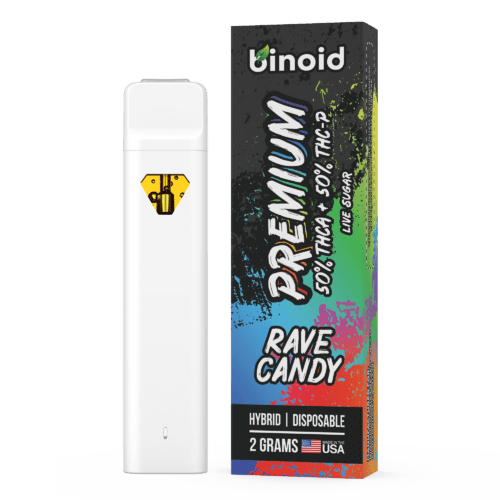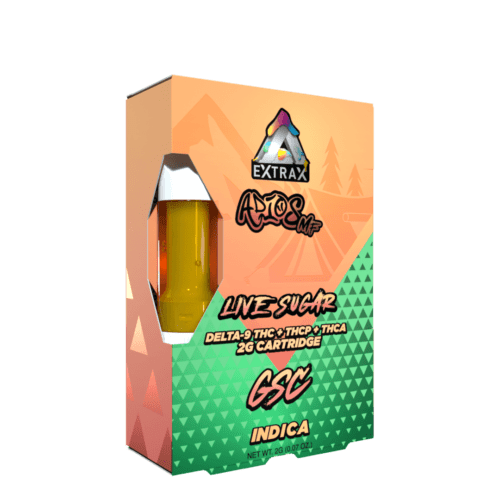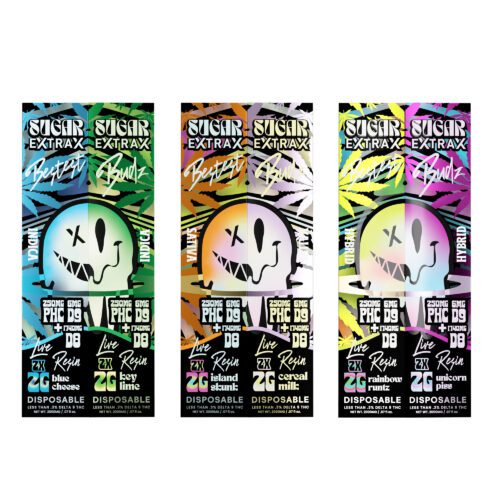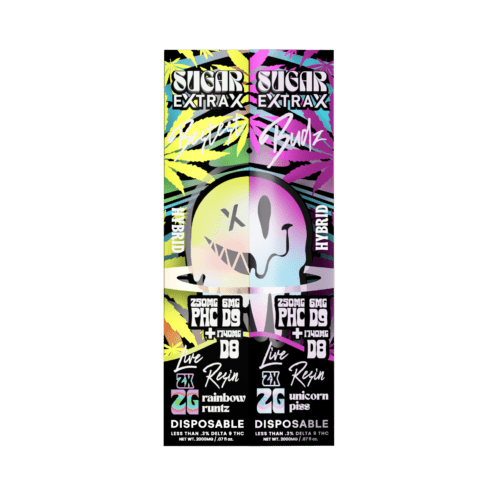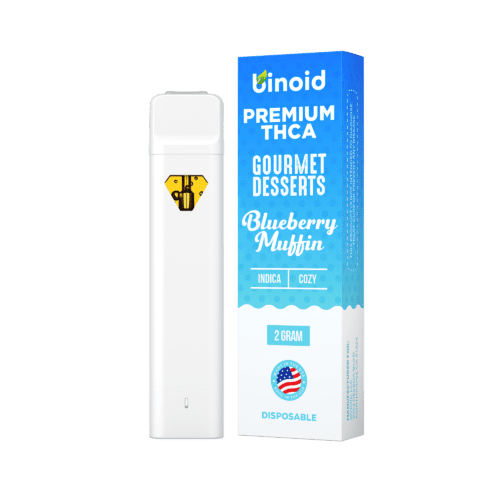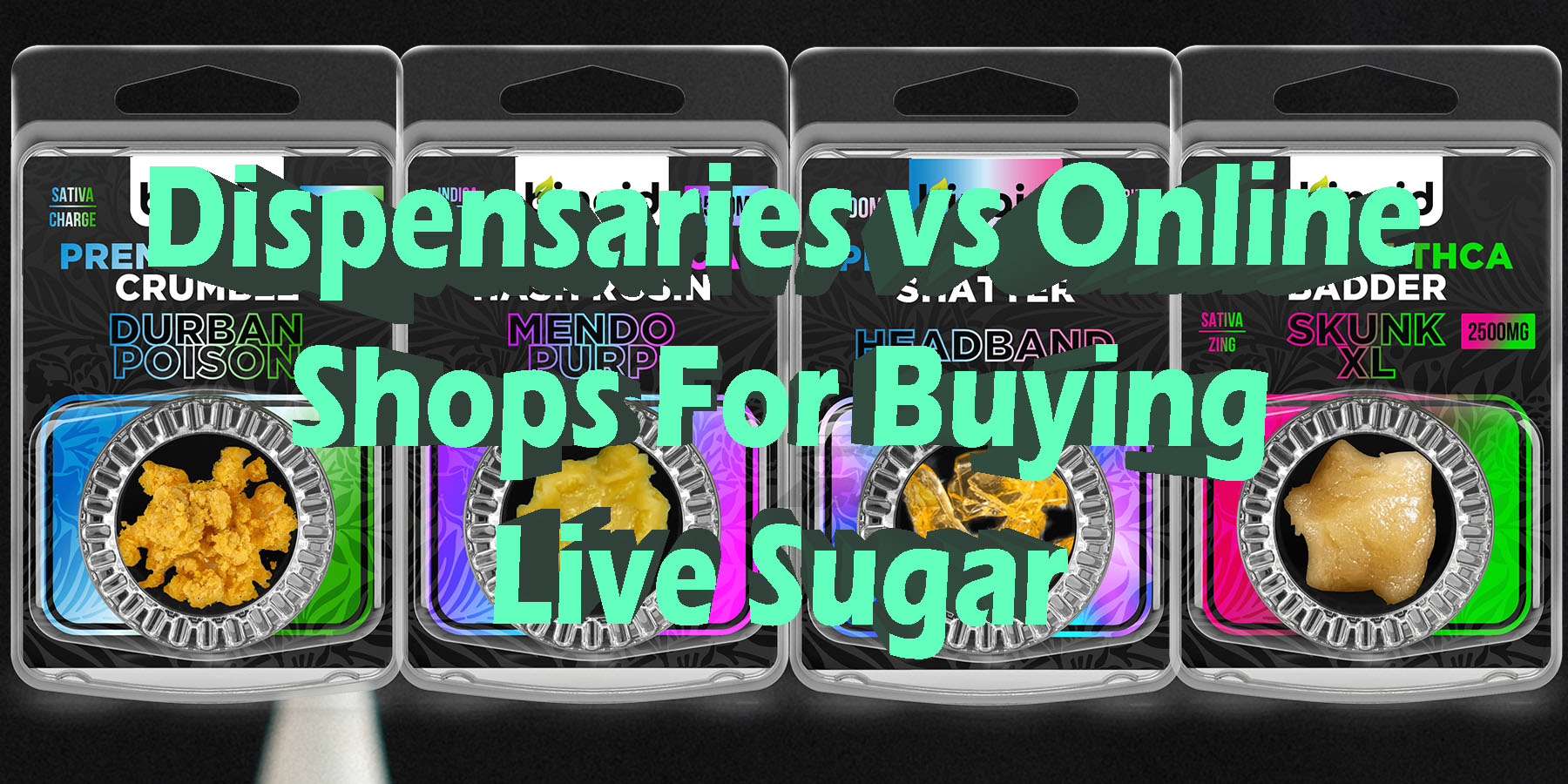
Buying Live Sugar Wax Online vs Dispensary: Which Is Better?
The world of cannabis concentrates is a vibrant tapestry of textures, aromas, and experiences, constantly enriched by skilled artisans who refine and reimagine its potent essence. Among these captivating creations, “live sugar” has emerged, sparkling with promise and beckoning connoisseurs with its unique crystalline structure and intensely aromatic profile.
As enthusiasts seek to indulge in this flavorful and potent extract, the question of sourcing naturally arises: does one navigate towards the familiar, regulated environment of a local dispensary, or explore the expansive, ever-evolving digital marketplace? This choice is more than a simple errand; it’s about aligning your personal approach to discovery with the avenue that best delivers on quality, variety, and overall satisfaction.
TO BUY LIVE SUGAR CLICK HERE
Recommended products
Getting to Know Cannabis Dispensaries and Online Cannabis/Hemp Shops and Their Purposes
Before we explore the granular details of live sugar and where to find this sought-after concentrate, it’s beneficial to establish a clear understanding of the two primary retail environments that define today’s cannabis and hemp commerce. Both physical, state-licensed dispensaries and their digital counterparts, online cannabis or hemp shops, serve as essential conduits for consumers. However, they operate under distinctly different business models and regulatory frameworks, which in turn shape the varied customer experiences they offer. Gaining insight into these retail settings will provide a solid foundation for appreciating how they cater to a wide spectrum of consumer preferences, particularly when one is on the quest for specialized and highly aromatic cannabis products.
Understanding Cannabis Dispensaries and Their Purpose
A cannabis dispensary is a state-authorized, physical retail establishment legally permitted to sell cannabis-derived products directly to eligible consumers. These stores have become an increasingly familiar presence in numerous communities throughout the nation, marking a significant evolution in cannabis accessibility driven by progressive state-level legislative changes. The fundamental purpose of a dispensary is to furnish a meticulously regulated and secure environment where adult consumers, or registered medical patients, can lawfully obtain a variety of cannabis goods, which naturally include flowers, a range of edibles, topical applications, and an array of concentrates.
They are specifically designed and managed to ensure unwavering compliance with stringent state-mandated regulations, covering crucial aspects such as thorough age verification processes, clearly defined limitations on purchase quantities, mandatory product testing procedures, and highly secure inventory control systems. This comprehensive regulatory oversight forms the very bedrock of their daily operations.
The architectural design and internal ambiance of a typical dispensary are often thoughtfully developed to reflect its dual commitment to stringent security protocols and the creation of a welcoming, informative atmosphere for its clientele. Generally, upon entry, patrons are first directed to a reception or check-in area where personal identification is carefully scrutinized by staff to rigorously confirm legal age or verify valid medical marijuana program registration. Once cleared, the customer enters the main retail space, which can vary significantly in its aesthetic presentation.
Products are customarily displayed within secure, often locked, glass showcases, accompanied by detailed menus, whether presented on digital screens or in printed form, that offer exhaustive information regarding various available strains, specific cannabinoid and terpene profiles, and anticipated or reported experiential effects. A signature element of the dispensary experience is the presence of “budtenders,” trained staff members proficient in guiding customers.
Dispensaries fulfill a pivotal and multifaceted role within the local economies and social fabric of the communities in which they are established. They operate as a critical intermediary, bridging the gap between licensed cannabis cultivators and processing facilities, and the ultimate end-user of the cannabis products. These establishments frequently represent a substantial source of local employment opportunities and contribute significantly to both state and municipal tax revenues, thereby integrating themselves as active participants in the economic vitality of their respective regions.
Beyond their purely commercial functions, a large number of dispensaries proactively embrace an important educational role, striving to equip their patrons with accurate, science-informed resources and accessible information concerning the principles of responsible cannabis use and the nuanced distinctions between various product categories. This ongoing commitment to comprehensive consumer education is of paramount importance, empowering individuals.
Furthermore, an indispensable purpose of any dispensary is to rigorously uphold and consistently ensure the quality, safety, and integrity of the products it offers, operating strictly within the confines of their state’s specific cannabis testing and compliance requirements. Licensed cannabis cultivators and product manufacturers who supply these retail outlets are legally obligated to adhere to clearly defined laboratory testing protocols designed to accurately determine cannabinoid potency and to meticulously screen for a range of potential contaminants.
The “seed-to-sale” tracking systems, which are a common fixture in most mature and regulated cannabis markets, introduce an essential layer of transparency and robust accountability into the supply chain. These systems enable individual products to be painstakingly traced from their initial point of cultivation or creation all the way through to the final point of sale, offering consumers a greater degree of confidence.
Recommended products
Understanding Online Cannabis/Hemp Shop and Their Purpose
An online cannabis or hemp shop is essentially a digital, e-commerce storefront that provides consumers with the capability to browse, evaluate, and purchase an extensive variety of cannabis or hemp-derived products through the internet. Upon completion of a purchase, these selected items are then systematically shipped directly to the customer’s specified residential or business address. The overarching purpose of these increasingly popular online platforms is to furnish a highly convenient, often more discreet, and geographically unconstrained alternative to the conventional experience offered by physical, brick-and-mortar dispensary locations.
The scope and operational models of these online shops can exhibit considerable variation; some function as direct-to-consumer (DTC) brands, managing their own product lines from formulation to final sale. Conversely, other online shops operate more like curated digital marketplaces, stocking and retailing a wide assortment of products sourced from numerous third-party brands.
The notable ascent and widespread proliferation of online hemp shops, in particular, have been inextricably linked to and significantly propelled by key federal legislation that reclassified hemp based on its Delta-9 THC concentration. This legislative action distinguished hemp from marijuana, stipulating that hemp and its derivatives must contain no more than 0.3% Delta-9 THC on a dry weight basis to be considered federally legal.
This pivotal legal distinction has effectively authorized online retailers to legally ship compliant hemp-derived products across state lines. This capability allows them to reach a vast consumer base in regions where state-licensed dispensaries may be entirely absent or where particular cannabinoid products might not be locally accessible. Consequently, these online vendors serve a crucial function in substantially expanding access to a diverse range of hemp-derived cannabinoids and innovative product formulations.
The successful operational execution of an online shop necessitates an unwavering and meticulous focus on several key areas: crafting a seamless and intuitive user experience, implementing highly efficient and reliable logistical operations, and maintaining absolute digital transparency, especially concerning product quality and safety.
A well-designed and reputable e-commerce website will invariably feature clearly defined product categorizations for easy navigation, comprehensive and accurate product descriptions, high-quality product images, and prominently displayed, easily accessible third-party laboratory reports, commonly known as Certificates of Analysis (CoAs), for every product batch offered. These CoAs are of particular and paramount importance in the online retail sphere, as they furnish independent, unbiased verification of a product’s precise cannabinoid composition and its confirmed safety profile. This practice is instrumental in building and maintaining deep-seated trust with consumers who cannot physically inspect items prior to purchase.
Moreover, online cannabis and hemp shops often position themselves at the forefront of product innovation and catalog diversity, demonstrating impressive agility and responsiveness in adapting to newly emerging market trends and dynamically shifting consumer preferences. Because these digital retailers are not typically constrained by the same physical shelf space limitations or localized inventory pressures that affect traditional brick-and-mortar stores, they are frequently able to offer a substantially more extensive, varied, and highly specialized range of products.
This often includes access to niche items, newly identified or synthesized minor cannabinoids, unique terpene blends, and avant-garde product formulations that might prove exceptionally challenging to locate within local dispensaries. This inherent dynamism allows them to effectively cater to an increasingly sophisticated and well-informed clientele, many of whom may be actively seeking very specific product attributes or novel cannabinoid experiences.
Recommended products
Exploring the Sweet Concentrate Known as Live Sugar
Live sugar is a highly prized cannabis concentrate celebrated for its delightful crystalline texture, intense aromatic profile, and potent effects. It typically appears as a collection of small, glistening crystals drenched in a flavorful terpene-rich sauce, resembling wet granulated sugar, hence its name. This consistency is achieved through meticulous extraction and post-processing techniques applied to fresh-frozen cannabis plant material, which preserves the most volatile and aromatic compounds often lost during traditional drying and curing.
The “live” aspect signifies this use of fresh-frozen cannabis, ensuring that the final product delivers a vibrant and authentic representation of the living plant’s fragrance and flavor, making live sugar a favorite among connoisseurs seeking a full-sensory cannabis experience.
The history of live sugar is a relatively recent development within the broader narrative of cannabis concentrate evolution, closely following the rise of live resin extraction technologies. As extractors mastered the art of creating live resin – capturing the fresh terpene profile of the plant – they began to explore ways to manipulate its final form and consistency. The creation of “sugar” textures emerged from controlled, or sometimes spontaneous, nucleation and crystallization of THCA within the terpene-rich live resin extract.
This process, where THCA begins to form small crystals, results in a product that is easier to handle than very saucy live resins but still retains an abundance of flavorful terpenes. Live sugar thus represents a specific refinement in the quest for diverse, flavorful, and potent solvent-based (typically BHO or similar) concentrates.
The science and chemistry behind live sugar lie in the careful interplay between cannabinoids, primarily THCA, and a high concentration of volatile terpenes, all derived from fresh-frozen cannabis. The fresh-freezing process locks in the plant’s original terpene profile. During extraction, often using hydrocarbon solvents like butane or propane, cannabinoids and terpenes are stripped from the plant material. The key to achieving the “sugar” consistency is a post-extraction process that encourages the THCA to partially crystallize into small granules rather than large diamonds or remaining fully homogenized in a sap.
This might involve specific temperature fluctuations, agitation, or a controlled purging process that allows some solvent to evaporate slowly, promoting the formation of these sugar-like THCA crystals suspended within the terpene sauce. The result is a stable yet incredibly aromatic and potent concentrate.
The effects of consuming live sugar are typically characterized by a rapid onset, significant potency, and an exceptionally rich and nuanced flavor experience. Thanks to the “live” extraction process, the high concentration of preserved terpenes works synergistically with the cannabinoids (predominantly THCA, which converts to Delta-9 THC upon heating) to produce a robust and often more complex effect profile than concentrates made from dried and cured material.
Users frequently report intense euphoria, heightened sensory perception, and depending on the strain’s original chemovar, effects ranging from invigorating mental clarity and creative bursts to profound physical relaxation and a sense of blissful tranquility. The vivid and authentic taste of the source strain is a hallmark of quality live sugar, making each consumption a full-bodied experience.
Live sugar’s appealing texture and potent, flavorful nature make it versatile for several popular consumption methods, offering users different ways to enjoy its benefits:
Vapes: While requiring careful formulation to ensure proper viscosity, high-quality live sugar can be used in vape cartridges and disposable pens. This often involves a process where the live sugar is gently heated or refined to achieve a consistency suitable for vaping, aiming to preserve its rich terpene profile for a flavorful and potent vapor. These products offer a convenient and discreet way to experience the full spectrum of live sugar on the go.
Wax Dabs: Dabbing is perhaps the most common and effective way to consume live sugar, allowing for full appreciation of its flavor and potency. Using a dab rig or an electronic nail, a small amount of live sugar is vaporized at a controlled temperature, producing an intensely aromatic and powerful vapor. This method allows the nuanced terpene profile to shine, delivering the true essence of the “live” concentrate directly to the consumer.
Gummies (No other edibles): Live sugar can be infused into gummies to create a premium edible experience. The challenge is to preserve the delicate terpenes during the infusion and gummy-making process. When done successfully, live sugar gummies can offer a more flavorful and potentially more well-rounded effect compared to edibles made with distillate, as the broader spectrum of compounds from the live sugar may contribute to a more holistic experience.
The versatility of live sugar extends to its ability to be formulated or found in conjunction with a spectrum of cannabinoids, particularly within the hemp-derived market, allowing for tailored experiences. This means live sugar’s terpene-rich base can be a carrier for or co-exist with various cannabinoid profiles:
Delta 8 THC: Live sugar products featuring Delta 8 THC combine the aromatic benefits of live terpenes with the milder, often more relaxing psychoactive effects associated with Delta 8.
Delta 9 THC: Traditional live sugar from marijuana is rich in THCA, which converts to Delta 9 THC, providing the well-known potent psychoactive effects and euphoria cherished by many users.
THCA (Tetrahydrocannabinolic Acid): Hemp-derived live sugar can be high in THCA. While minimally psychoactive in its raw form, it delivers potent Delta 9 THC effects when heated (vaped or dabbed), offering a compliant yet powerful option.
THCV (Tetrahydrocannabivarin): Live sugar incorporating THCV might offer a more uplifting, focused, and potentially appetite-suppressing experience, adding another dimension to the concentrate’s effects.
HHC (Hexahydrocannabinol): HHC live sugar would provide the unique psychoactive effects of HHC, known for its stability and similarity to Delta 9 THC, but enhanced by a rich live terpene profile for better flavor and a more nuanced experience.
THC-P (Tetrahydrocannabiphorol):Given THC-P’s high potency, live sugar formulations featuring THC-P would aim to deliver an exceptionally strong psychoactive experience, with the live terpenes contributing to a more enjoyable and well-rounded effect despite the intensity.
Recommended products
Why Can Live Sugar Be Found at Either a Dispensary or an Online Shop?
The availability of sought-after concentrates like live sugar in both state-licensed dispensaries and through various online e-commerce platforms is a direct result of the dual legal frameworks governing marijuana and hemp within the United States. These distinct regulatory pathways determine how different types of live sugar products are produced, distributed, and sold to consumers.
State-regulated dispensaries are the established venues for live sugar derived from marijuana plants, which typically contain Delta-9 THC concentrations (or THCA that converts to Delta-9 THC) exceeding the federal hemp limit. The production, rigorous testing for potency and contaminants, and sales of these marijuana-derived live sugar products are all managed under the comprehensive cannabis control programs specific to each state. This system ensures that consumers within those states have access to these products in a controlled and safety-conscious environment.
Conversely, online shops predominantly feature live sugar derived from hemp, which is federally legal provided it contains no more than 0.3% Delta-9 THC by dry weight, a distinction established by federal agricultural legislation (2018 Farm Bill). This allows online retailers to sell and ship hemp-derived live sugar to a much broader audience across many states, including those that have not legalized marijuana for recreational or medical use.
Breaking Down the Live Sugar Buying Matchup: Dispensaries vs. Online Shops
When you’re looking to acquire live sugar, with its enticing granular texture and burst of fresh terpenes, the decision of where to purchase it—a traditional state-licensed dispensary or a dynamic online shop—becomes a central part of the experience. Each option offers a distinct set of advantages and potential drawbacks, influencing factors such as product variety, access to detailed information, pricing, and overall convenience. A clear understanding of what each retail environment brings to the table will help you choose the source that best aligns with your personal preferences and specific needs for this exquisite cannabis concentrate.
Contender #1: Dispensaries
State-licensed dispensaries serve as established, physical locations where consumers can legally purchase high-quality concentrates like live sugar. These retail outlets operate under strict state regulations that oversee product sourcing, testing, and sales, providing a controlled purchasing environment. For many, dispensaries offer a trusted and familiar way to explore these flavorful, crystalline extracts. A key characteristic is the direct interaction with products, to the extent packaging allows, and knowledgeable staff, culminating in the immediate acquisition of chosen items—a significant draw for those who prefer not to wait for their desired concentrate.
The dispensary experience for obtaining live sugar is often centered on compliance and personalized customer service. Budtenders are typically available to explain the nuances of these concentrates, such as the expected flavor profile based on its “live” nature or its crystalline texture, helping guide selections based on individual preferences for potency and aromatic experience. This direct consultation can be especially useful for those newer to such potent products or those seeking specific effects like profound euphoria or enhanced clarity. Furthermore, products sold in dispensaries undergo mandatory state testing, offering a level of assurance regarding their cannabinoid profile and purity from certain contaminants.
Pros & Cons
Choosing a dispensary as your source for live sugar comes with a specific array of advantages and disadvantages. These elements can significantly influence whether this conventional retail option suits your particular requirements for convenience, product access, expert advice, and overall satisfaction when seeking this uniquely textured and aromatic concentrate.
Pros:
Immediate Product Acquisition: The most notable benefit is selecting your live sugar and taking it home immediately, without any delay associated with shipping.
Expert In-Person Guidance: Budtenders can offer personalized advice, explain the terpene profiles of specific live sugar strains, and discuss ideal consumption methods for its texture.
Tangible Product Assessment (Limited): Although typically pre-packaged, consumers can often visually inspect the live sugar through its container, assessing its color, consistency, and crystal formation.
Support for Local Economy: Purchases made at local dispensaries directly contribute to the local business ecosystem, fostering jobs and generating tax revenue for the community.
Assured Regulatory Compliance & Testing: Products sold in dispensaries must adhere to state-specific testing standards for potency and purity, offering a baseline of quality control for live sugar.
No Shipping Concerns: This option eliminates anxieties related to shipping delays, potential damage during transit, or the security of the delivered package.
Discovery of Local Craft Producers: Dispensaries often feature live sugar from smaller, local artisans who specialize in high-quality concentrates that may not be widely available online.
Cons:
Geographical Limitations: Access is restricted to individuals living in or able to travel to states with legal cannabis dispensaries, and store locations may not always be convenient.
Typically Higher Price Points: The operational costs of a physical store can often result in higher retail prices for live sugar compared to some online sources.
More Limited Selection: Due to physical space constraints, a dispensary’s inventory of live sugar brands, specific strain varieties, or unique cannabinoid blends might be less extensive than what larger online retailers offer.
Restricted Hours of Operation: Dispensaries operate within specific business hours, limiting purchasing opportunities to those times, unlike the constant availability of online stores.
Recommended products
Contender #2: Online Shops
Online cannabis and hemp shops have swiftly become major players for sourcing high-quality concentrates like live sugar, offering a modern and direct purchasing route. These digital storefronts leverage the internet’s vast reach to serve a national clientele, sidestepping geographical limitations. Their core appeal for enthusiasts of these terpene-rich, crystalline extracts often lies in the sheer convenience of Browse from anywhere, accessing an expansive selection that frequently includes unique or hemp-derived live sugar formulations, and even enjoying a discreet shopping experience with delivery direct to their door. Online retailers can showcase a remarkable diversity, connecting consumers with numerous producers and specialized small-batch offerings that might be otherwise unavailable locally.
Purchasing live sugar online is typically characterized by detailed product information and easy comparison of different options. Reputable e-commerce platforms provide comprehensive descriptions, including details on cannabinoid profiles and terpene content, and critically, direct access to third-party Certificates of Analysis (CoAs). This ensures transparency about potency and purity before any commitment is made, empowering buyers to research thoroughly and choose with confidence. Furthermore, leading online vendors invest in user-friendly websites, secure transaction processes, and reliable shipping methods, often complemented by educational resources and responsive customer support to build trust and guide consumers in their selection of these potent, flavorful concentrates.
Pros & Cons
Opting for an online shop to source your live sugar presents an appealing list of benefits, while also carrying some inherent considerations that warrant attention. These aspects underscore the modern conveniences and unique dynamics of purchasing concentrates through digital platforms, especially for terpene-rich products like live sugar.
Pros:
Exceptional Convenience and 24/7 Access: The ability to browse and buy live sugar at any time, from any location with an internet connection, with products delivered directly to your door, offers ultimate ease.
Broader Product Variety and Niche Offerings: Online shops generally boast a more extensive inventory, often featuring a wider array of live sugar strains, diverse terpene profiles, and numerous hemp-derived cannabinoid options.
Competitive Pricing and Promotions: Reduced overhead compared to brick-and-mortar stores can lead to more attractive pricing for live sugar, with online retailers frequently offering sales and loyalty rewards.
Discreet Purchasing Experience: For consumers who prioritize privacy, online shopping provides a confidential method for acquiring live sugar, typically delivered in plain, unmarked packaging.
Comprehensive Information and Lab Verification: Reputable online stores provide extensive product details, customer reviews, and easily accessible third-party CoAs, ensuring transparency regarding the live sugar’s contents.
Wider Geographic Reach (especially for Hemp Products): Hemp-derived Live sugar (e.g., THCA or Delta 8 based) can often be shipped to many states, including those lacking legal marijuana dispensaries.
Access to Specialized and Craft Producers: The online marketplace is an excellent venue for discovering artisanal or boutique brands that specialize in high-quality live sugar but may not have widespread dispensary distribution.
Pressure-Free Browse and Research: Customers can take their time to explore options, compare different live sugar products, and conduct thorough research without feeling rushed by in-person sales environments.
Cons:
No Physical Product Inspection Pre-Purchase: Consumers cannot physically see or assess the texture and true aroma of the live sugar before buying, relying entirely on product images, descriptions, and lab reports online.
Shipping Delays and Potential Complications: Delivery is not instantaneous and can take several days; there’s also a minor risk of shipping errors, transit damage, or package security issues.
Need for Diligent Vendor Vetting: The online realm necessitates careful research to identify trustworthy sellers of live sugar; while many are reputable, there’s a possibility of encountering sites with inaccurate information or lower quality control.
Absence of Immediate, Face-to-Face Support: While online customer service is usually available, it differs from the immediate, interactive dialogue possible with a budtender for instant advice on live sugar.
Recommended products
Which Option is the Best for Your Live Sugar Needs?
The allure of live sugar, with its glistening tapestry of crystals and explosive aromatics, truly lies in its promise of a full-spectrum sensory immersion. Choosing where to procure such a vibrant concentrate is less about a simple transaction and more about curating your personal journey into the heart of cannabis artisanship. For some, that journey finds its most reassuring footing on familiar ground, where the tactile confirmation of a local dispensary and the direct dialogue with knowledgeable purveyors offer a satisfying clarity and immediate connection to the craft. This path grounds the experience in a trusted, hands-on tradition.
As your palate for these exquisite extracts refines, however, the horizon of discovery often beckons. The expansive digital marketplace for cannabis acts as a vast, dynamic library, offering enthusiasts of live sugar an unparalleled catalog of nuanced expressions and pioneering producers from far-flung corners. It’s a space where dedicated exploration can uncover rare gems and highly specific profiles, empowering a deeper, more personalized engagement with the ever-evolving art of concentrate creation. Ultimately, the most rewarding live sugar experience will spring from the source that not only meets your immediate desires for quality and flavor but also resonates with your spirit of adventure and your evolving relationship with cannabis discovery.

